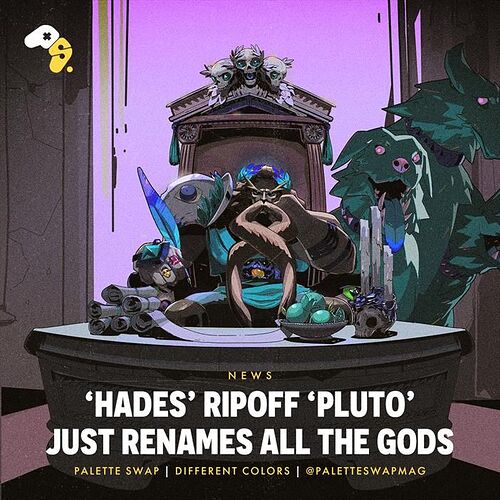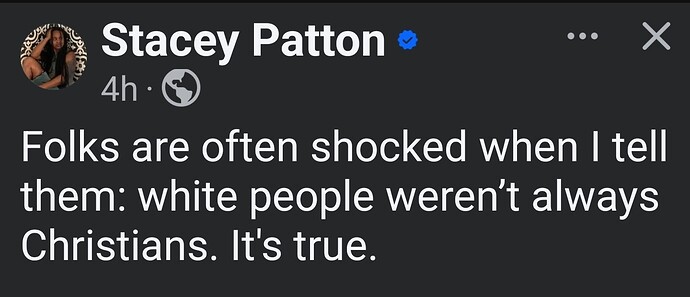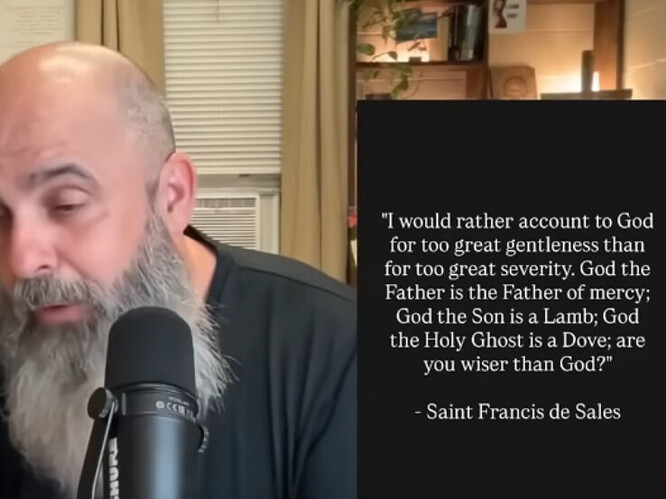Meanwhile at Mount Olympus, the Greeks learn about Roman religion.
Hmmm; my parents were sort of spiritual but agnostic, my father was a member of the Spiritualist Church when he was a child and teen in England, but he broke from them after becoming an adult. My mother was raised in the United Church (I think it’s like the Episcopalian Church in the U.S.), but was not attending church by the time she got married. They were very casual about churches and religion, but did insist that my sister and I attend church (United Church) for at least a couple of years so that we’d know what it was about and would have the information we needed to make up our own minds. As a similarly semi-spiritual agnostic leaning more to atheism as I get older, my attitude is “you do you”. So my casual attitude and lack of evangelism may have been absorbed from my parents.
Yeah, no shit.
Wasn’t trying to be glib, so sorry if it came off that way… Just… yeah, he’s not a believer.
But as to the content, it’s interesting that she took this side-trip through the transhumanist movement and found it wanting… but I guess I’m not convinced of the Max Weber argument, “just go to church”… that’s just not going to satisfy everyone. Maybe we need something “spiritual” in our lives, but they can be any number of ways to think about that, and that’s likely to be contextual as much as anything…
Trump believes in God. Talks to him every morning too. In the mirror.
Speaking “in context of abortion," Talarico said, “Before God comes over Mary and we have the incarnation, God asks for Mary’s consent, which is remarkable. … I mean, the angel comes down and asks Mary if this is something she wants to do, and she says, if it is God’s will, let it be done. Let it be. Let it happen. So, to me, that is an affirmation in one of our most central stories that creation has to be done with consent. You cannot force someone to create. Creation is one of the most sacred acts that we engage in as human beings. But that has to be done with consent. It has to be done with freedom.”
It’s because of that biblical exchange, Talarico added, that he “comes down on that side” of the abortion debate.

Maybe. I was raised Methodist, which isn’t evangelical (or wasn’t . . . it arguably half is now? . . . schisms are fun!), and I’m a pretty chill atheist. Like, I really don’t care if other people believe or not. As long as you don’t impose your beliefs on me, or try to convert me, you are welcome to believe in Zeus. I don’t care.
Before they became the missionaries, inquisitors, witch burners, colonizers, and slave traders, white Europeans were once the colonized. They were pagans, animists, and ancestor-venerators. They worshipped in forests, danced around bonfires, honored goddesses and spirits, followed the moon, and buried their dead with ritual and reverence. Their bodies were sacred. Their gods lived in rivers, trees, and stars, not in cathedrals. They didn’t worship a white man on a cross. They didn’t believe in heaven.
In Celtic lands, they honored Brigid and Cernunnos. In Scandinavia, they praised Odin and Thor. In Germanic and Slavic regions, they lit candles on rivers, worshipped gods of thunder and fertility, and protected their homes with spirits. Even in Greece and Rome, the divine was everywhere, in wine, sex, music, death. These weren’t fringe beliefs. They were Europe’s dominant spiritual systems for millennia.
Then came Christianity, not as a gentle gospel, but as empire. Rome didn’t adopt it for holiness, it adopted it for power. It fused church and state, crushed resistance, and declared that loyalty to God was loyalty to Caesar. Villages were conquered, altars destroyed, ancestral rites outlawed. Pagan gods were recast as demons. Folk healers became witches. Children were taught that their ancestors were evil, their desires were sinful, and their salvation required submission.
The same Europe that would later sneer at African religions as “primitive” had already erased its own.
Christian colonization didn’t start in Africa or the Americas. It started in the forests of Germany, the highlands of Scotland, the farms of France, and the backroads of Italy. It began by convincing poor white people that their natural ways of knowing, of healing, of honoring the land, of connecting to spirit were dangerous.
By the time ships crossed the Atlantic, Europe had been spiritually gutted. Its gods were buried. Its matriarchs burned. Its peasants broken in by religious law.
And the Bible was colonized too. It wasn’t handed down whole. It was assembled by councils, edited by kings, and weaponized by empire. What began as oral tradition was cut, redacted, and rewritten to crown monarchs, justify war, and crush dissent.
So when enslaved Africans were handed a Bible, it wasn’t a message of liberation, it was a plantation manual. Hollowed out. Rinsed in empire. Designed to keep the enslaved obedient and the enslavers divine.
the rest
The very people who forced Christianity on us, white colonizers and slaveowners, had it forced on them first. So the tragedy is double-layered.
We inherited a religion that was already a tool of conquest. We were handed a Bible that had already been redacted by kings, sanitized by empires, and weaponized against the poor. We were told to trust the same cross that had crushed entire cultures long before it ever reached African shores.
And yet, we made it ours. We found rhythm in the chains. We whispered resistance into hymns. We turned a tool of submission into a source of survival. That’s the brilliance and the heartbreak.
But the irony still stands: we are worshiping inside a house built by people who were spiritually colonized, before they ever colonized us. We took comfort in a doctrine that once robbed them of theirs. We were handed a gospel of obedience that had already been used to domesticate white peasants, to silence their grandmothers, to demonize their gods.
And now here we are, descendants of the enslaved, still clutching the colonizer’s Bible, still calling on a name that came to us not through revelation, but through chains.
That doesn’t make our faith illegitimate. But it does demand that we tell the truth about how it got here.
Because only when we name the irony can we begin to untangle the trauma. Only when we see how colonization moves through spirit as much as land can we begin to reclaim what was taken from us.

UGH, there is an ATL connection, too, with In Touch Ministries, who has an association with my sister’s church…
Her pastor is that guy’s son.
Yeah, and it has an ATL connection, too… I’m so sick of these fucking colonizers. Go away, dipshits, no one wants your shitty version of god.
This is legalized work place relligious-based bullying.






